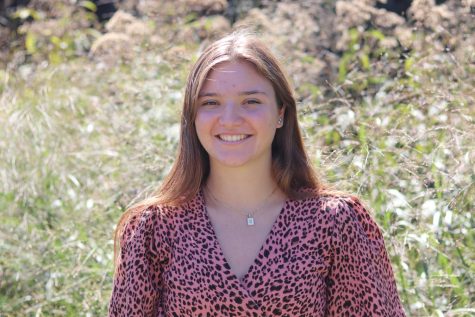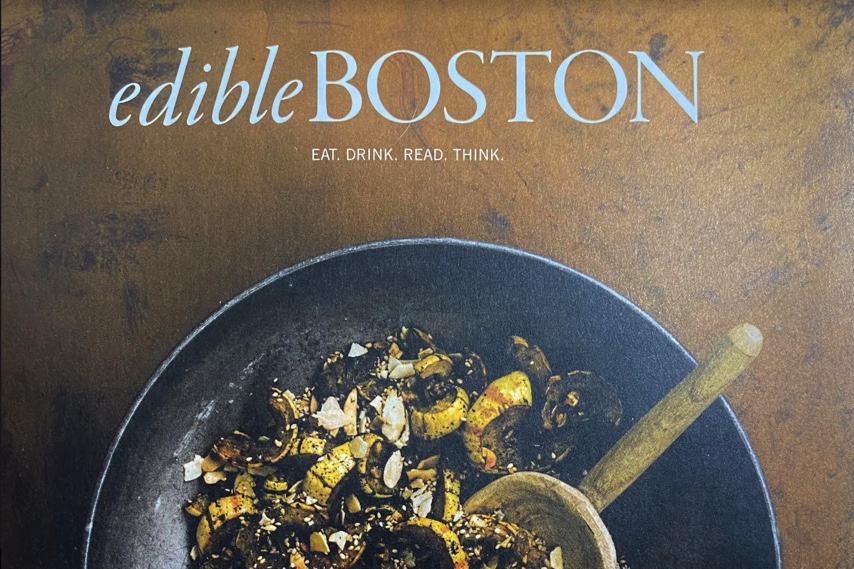Edible Boston’s new home in Wayland
Credit: Sophia Oppenheim
Wayland resident, Sarah Blackburn, and her husband now own the magazine “Edible Boston.” The couple purchased the magazine in 2019, after Blackburn had been working with the magazine for almost 10 years. “Food is life,” Blackburn said. “Food is what everyone wants to talk about. The best thing about our magazine is that it’s not news, you can pick up an old copy from 2016 and it’s still relevant.”
The local food and sustainability magazine, Edible Boston, is now run out of Wayland resident Sarah Blackburn’s home office. Edible Boston is the only food magazine that is dedicated solely to local food, agriculture and sustainability in Greater Boston. The magazine offers four free seasonal issues each year and is distributed at the business places of the advertisers in the magazine.
Blackburn and her husband, Christopher, bought the magazine in 2019 from the former owner, Ilene Bezhalar. Bezhalar was ready to pass the torch after planning to retire and move to California. Over the past couple of years, Blackburn has successfully continued the production of the magazine.
“[Advertising sales and light marketing] was just talking to local food businesses, farmers, bakers and restaurateurs,” Blackburn said. “It was great, it was essentially asking them to support a magazine they already read and believed in.”
Blackburn originally discovered the magazine at a farmer’s market she worked at in the early 2000s. She met Bezhalar there, and when she moved to Wayland in 2010 with her husband and two kids, she asked if Bezhalar had any jobs open for her to work at the magazine. Blackburn was then hired for an advertising sales and a marketing position; however, through her time with the magazine, she also had the job of the managing editor and recipe editor.
“When I first started with the magazine, Ilene’s favorite tagline was that the magazine was ‘the People Magazine of food,’” Blackburn said. “I still feel that way, but I think what we do best and what we can excel at is introducing different kinds of businesses and different kinds of foods to audiences that probably still [perceive us as] skewed to more wealthy and suburban audiences.”
Before starting her job at Edible Boston, Blackburn’s only experience in working with a magazine was organizing notes for the Middlebury Magazine. Blackburn graduated from Middlebury College with art history and Italian degrees. Her background in the food world began after college when she lived in Italy and then worked at Formaggio Kitchen.
“I have learned everything about [magazines] walking into it backwards,” Blackburn said. “I was a [Formaggio Kitchen] import buyer, so I went to Europe a lot and learned about really fancy, imported specialty foods. My mindset kind of changed, and I wanted to talk more about local food and why that was really important.”
Now that Blackburn is the editor-in-chief of Edible Boston and Edible Worcester, she writes a new editorial for each issue which can be found in the first few pages of the magazine. The magazine is filled with short stories about local businesses, full articles about local business owners, recipes and advertisements.
“Getting to know the story behind the food is so important,” Blackburn said. “You can buy a beautiful package of cookies and that’s it, or you can buy the beautiful package of cookies, open a magazine and read about why the baker decided to create that particular brand of cookie or why they decided to leave a high tech business career and go into baking.”
Blackburn works with a staff of 40 to 50 rotating freelance writers and talented photographers that help to create each issue. Meetings take place at her home office in Wayland. However, the Edible Community reaches global levels with more than 90 different independently owned magazines being based out of the United States and Canada.
“I want to just keep producing four beautiful issues a year, maybe someday we would make six issues a year if we get a little more help,” Blackburn said. “We are a print magazine which a lot of people assume is a dying breed and so in some ways we are trying to up our digital presence. What is so special about [the physical magazine] is how it feels in your hands, just being able to sit in a quiet, maybe sunny window in the winter time and look through the magazine and shut everything else out is so special.”
For the future of the magazine, Blackburn hopes to show readers the importance of sustainable living and protecting farmland from being the foundation of a new shopping mall. She also wants to continue to feature more subjects of stories with different ethnic backgrounds, since she feels the local food and farming business has been a white oriented field for years.
“What’s really great is when the article is important to the subject of a story,” Blackburn said. “When I go to a farmer’s market and run into a subject of a story, maybe even from a couple years ago, and they have the story laminated, and put out on a table… that has always made me feel good knowing these stories have meant so much to them.”
Your donation will support the student journalists of Wayland High School. Your contribution will allow us to purchase equipment, cover our annual website hosting costs and sponsor admission and traveling costs for the annual JEA journalism convention.

Sophia Oppenheim, Class of 2023, is a third year reporter and co-features editor for WSPN. She plays on the school’s field hockey and swim team. In her...





![Last Wednesday, the Wayland School Committee gathered to discuss a number of topics regarding the health curriculum and Innovation Career Pathway course. Another large topic of conversation was the ways to potentially mitigate distracting cell phone usage. "These [phones] are going to distract your learning and social relationships," Superintendent David Fleishman said. "That's concrete right there."](https://waylandstudentpress.com/wp-content/uploads/2025/06/Screenshot-2025-06-04-at-9.49.31 PM-1200x886.png)























